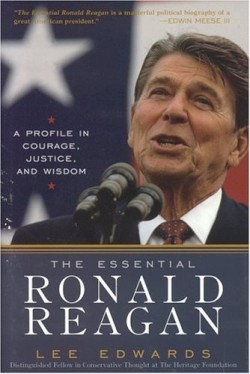It looks like you've stumbled upon a page meant to be read by our code instead of viewed directly. You're probably looking for this page.
The Essential Ronald Reagan
Courage Justice and Wisdom
The final goodbye of America’s former two-term president (1980—1988) took place on June 5, 2004. Ronald Wilson Reagan, actor, governor, and president, died at the age of ninety-three from Alzheimer’s disease. He was hailed as the “great communicator,” the champion of tax reform, and the architect of the “Reagan Doctrine,” which sought to defeat Communism around the globe. Or, was he? Prior to and following his death, there has been a spate of books that have sought to capture “the essential Ronald Reagan.”
The author, Distinguished Fellow in Conservative Thought at the Heritage Foundation, has written a political biography of Reagan that traces the evolution of his political philosophy, starting with “Dutch” Reagan’s hardscrabble youth in Illinois, his time as a student at Eureka College, his nascent career in show business as a radio announcer, and his stardom in Hollywood. Edwards offers an interesting perspective on Reagan’s transformation from a liberal Democrat who was an enthusiastic supporter of Franklin Roosevelt to a conservative Republican who eschewed big government.
He illustrates how Reagan’s involvement with the Screen Actors Guild, as board member and later president, played a pivotal role in his political maturation. Edwards states that during this time, Reagan’s “studio and union problems began to share equal time with world conditions in his conversations.” It appears that Reagan’s anti-Communist stance grew at a time when he began to speak out actively against perceived Communist attempts to control the entertainment industry in the 1940s and 1950s. This early phase of Reagan’s political development, from his college years through his initial foray into politics as a seeker for the governor’s seat in California, are the most compelling and insightful aspects of the book.
Edwards concludes with a chapter that explores the qualities that make a good political leader—such as courage, prudence, justice, and wisdom—which the author believes Reagan possessed “in abundance.” While his treatise on political leadership may seem overly simplistic, his admiration for his subject is apparent. His criticism of “liberal intellectuals” such as Arthur Schlesinger and John Kenneth Galbraith, for what he perceives as their lack of insight and support for Reagan’s political war against the “evil empire” that characterized the former Soviet Union, will be of particular interest.
Men and women across the country sincerely mourned the man who, to many, symbolized the quintessential American. Overall, readers will find this book to be both well-written and informative. The author has provided an important political analysis of Reagan and his presidency. It will be interesting to watch how future political biographies of Ronald Wilson Reagan will assess him as a man and as a politician.
Disclosure: This article is not an endorsement, but a review. The publisher of this book provided free copies of the book to have their book reviewed by a professional reviewer. No fee was paid by the publisher for this review. Foreword Reviews only recommends books that we love. Foreword Magazine, Inc. is disclosing this in accordance with the Federal Trade Commission’s 16 CFR, Part 255.
